The following analysis of select counties of the Eastern Washington real estate market is provided by Windermere Real Estate Chief Economist Matthew Gardner. We hope that this information may assist you with making better-informed real estate decisions. For further information about the housing market in your area, please don’t hesitate to contact your Windermere Real Estate agent.
Regional Economic Overview
Year over year, total employment in Eastern Washington rose by just under 10,000 jobs, which is an annual growth rate of 2.1%. Benton County had the fastest pace of job growth at 3.8%. Also notable were Spokane and Franklin counties, where job growth rose 2.9%. Annually, employment shrank in Whitman and Lincoln counties. Unadjusted for seasonality, the regional unemployment rate was 4.6%; the seasonally adjusted rate was 5%. The highest jobless rate was in Franklin County at 5.3%. The lowest rate was in Walla Walla County at 4%.
Eastern Washington Home Sales
❱ During third quarter, 3,305 homes sold, which was 21.8% lower than a year ago. Transactions fell 4.6% compared to the second quarter of this year.
❱ Listing activity rose 97.2% compared to a year ago and was 74.9% higher than in the second quarter.
❱ Year over year, sales fell across the region. Additionally, sales fell in all the markets covered by this report compared to the second quarter of 2022.
❱ Even with more choice in the market, pending sales fell more than 14%, suggesting that significantly higher mortgage rates are now having an impact on the market.
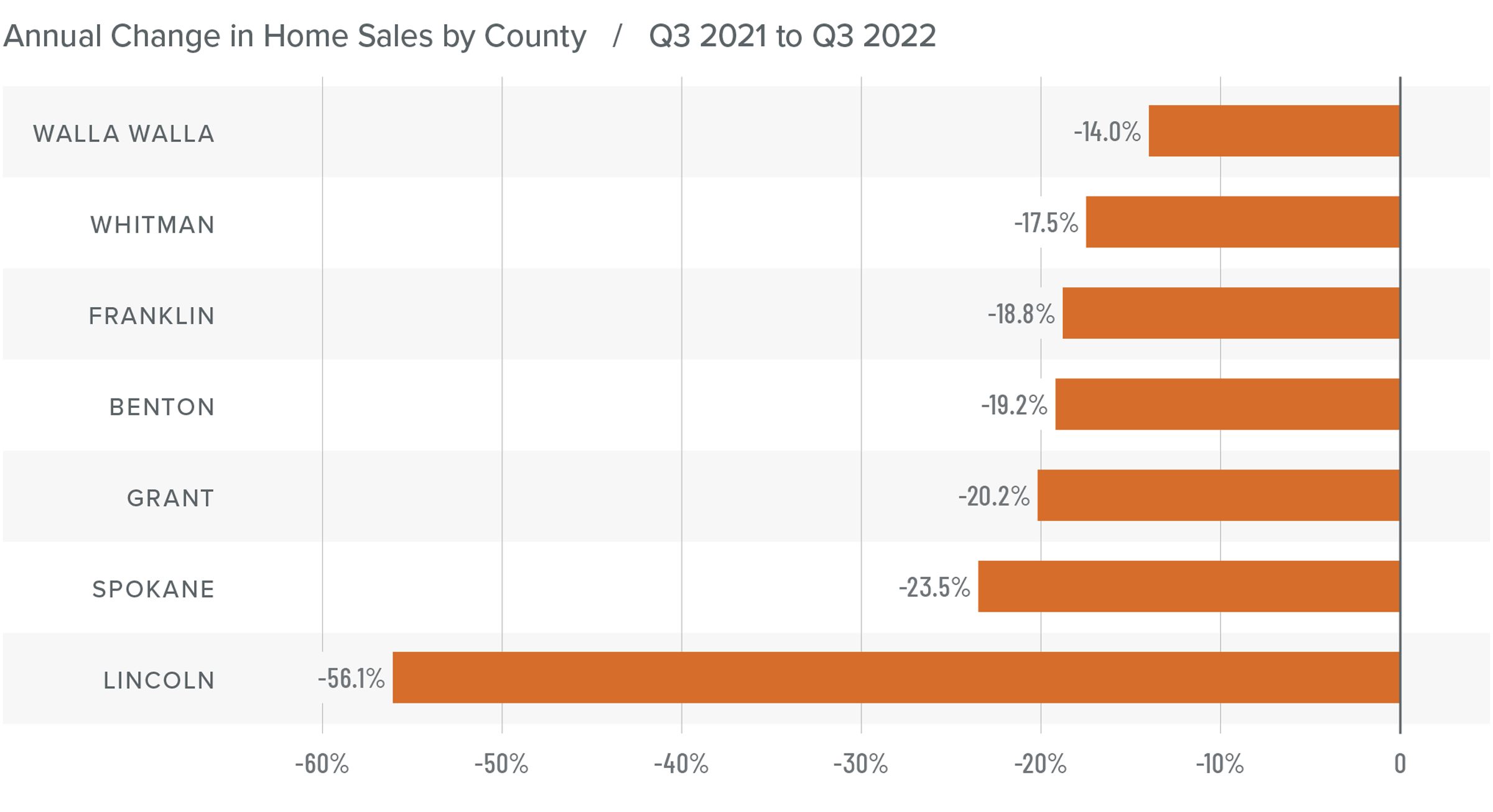
Eastern Washington Home Prices
❱ Year over year, the average home price in Eastern Washington rose 8.8% to $463,324, but average prices were down 2.7% compared to the second quarter.
❱ Compared to the second quarter of 2022, prices fell in all counties except Benton, Lincoln, and Whitman.
❱ Every county saw average sale prices increase year over year, with significant gains in Whitman, Lincoln, Walla Walla, and Benton counties.
❱ Significantly higher mortgage rates are starting to impact the market, which has led median list prices to drop in Spokane, Franklin, Whitman, and Grant counties compared to the previous quarter.
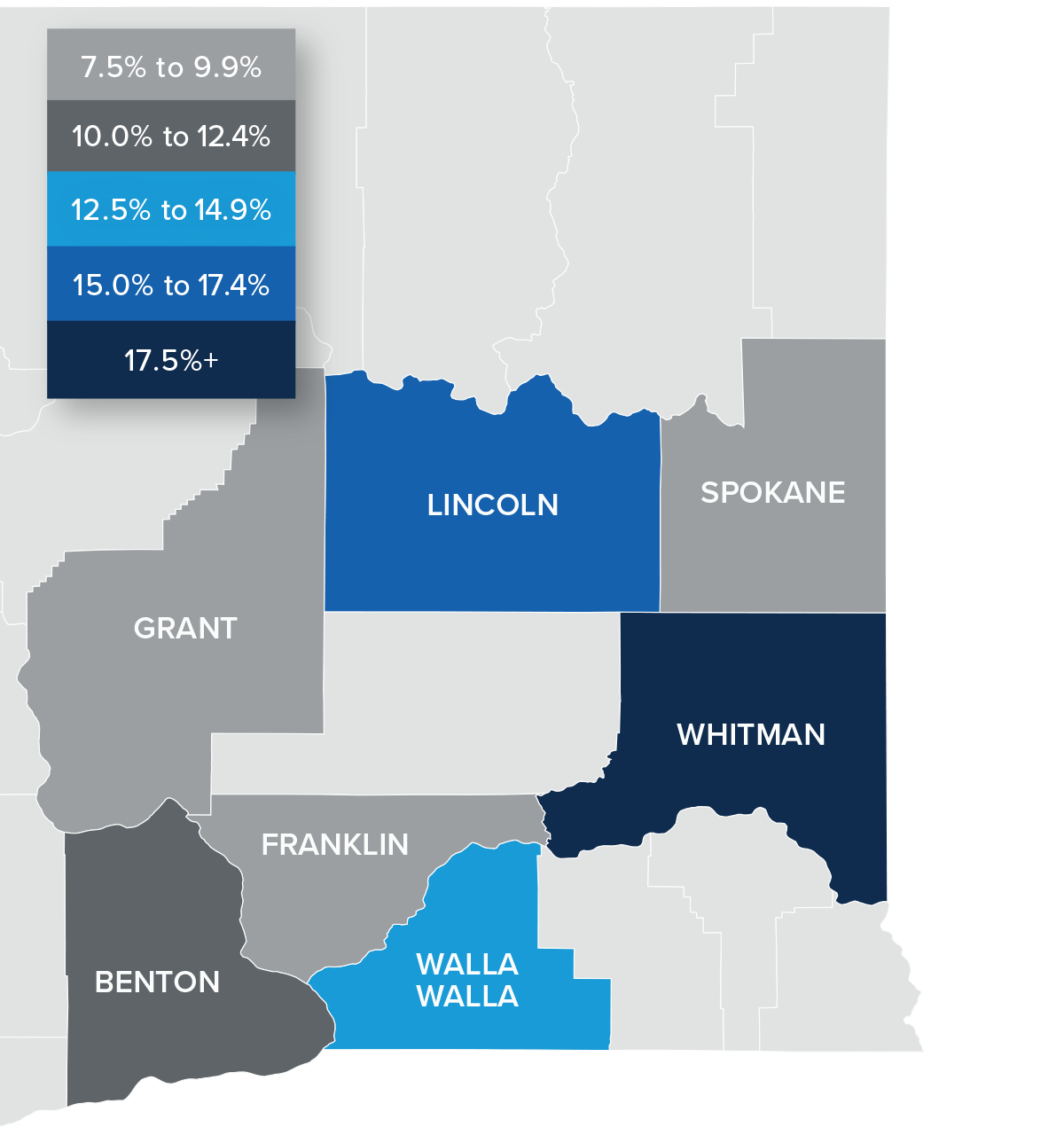
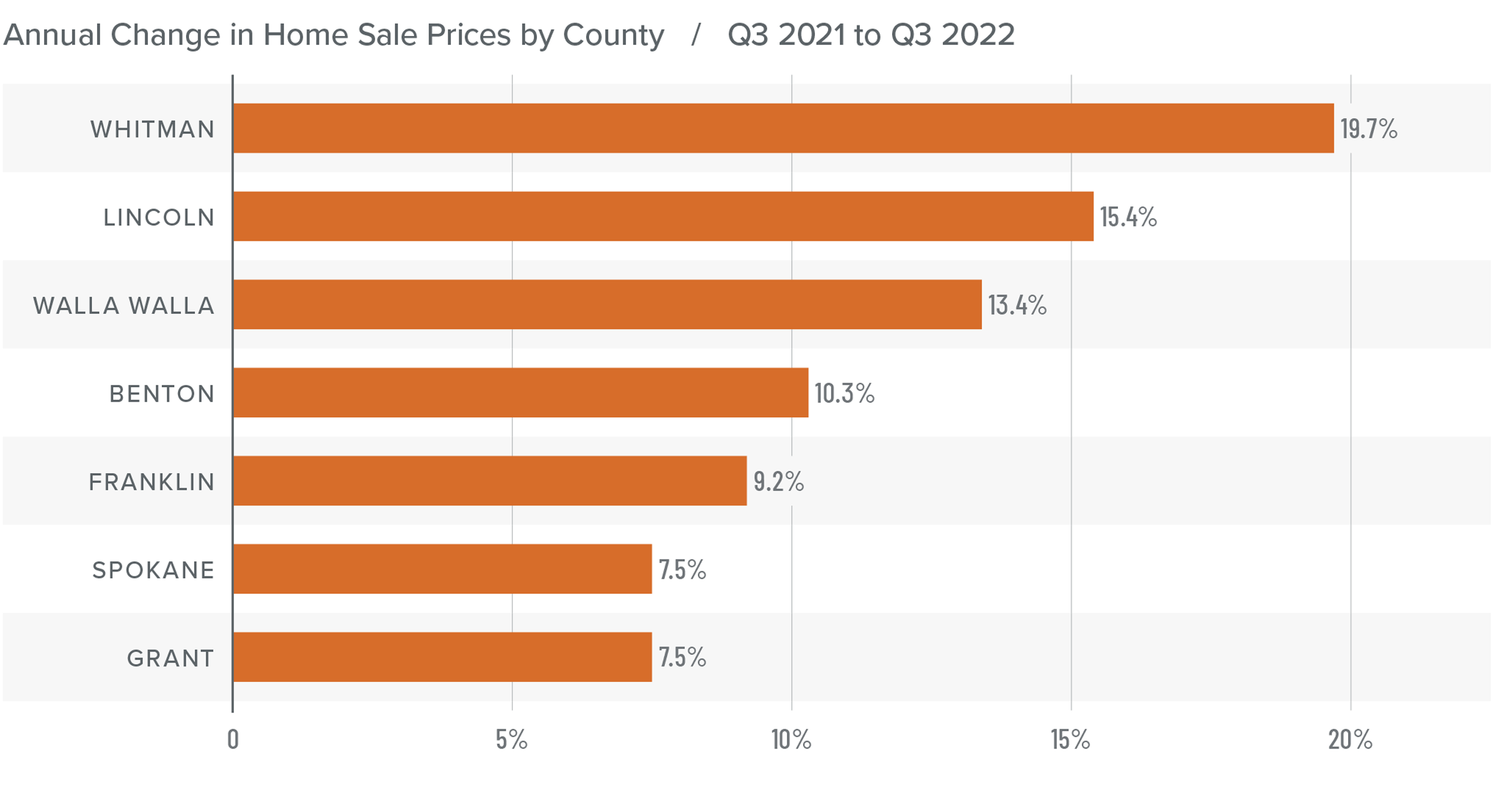
Mortgage Rates
This remains an uncertain period for mortgage rates. When the Federal Reserve slowed bond purchases in 2013, investors were accused of having a “taper tantrum,” and we are seeing a similar reaction today. The Fed appears to be content to watch the housing market go through a period of pain as they throw all their tools at reducing inflation.
As a result, mortgage rates are out of sync with treasury yields, which not only continues to push rates much higher, but also creates violent swings in both directions. My current forecast calls for rates to peak in the fourth quarter of this year before starting to slowly pull back. That said, they will remain in the 6% range until the end of 2023.
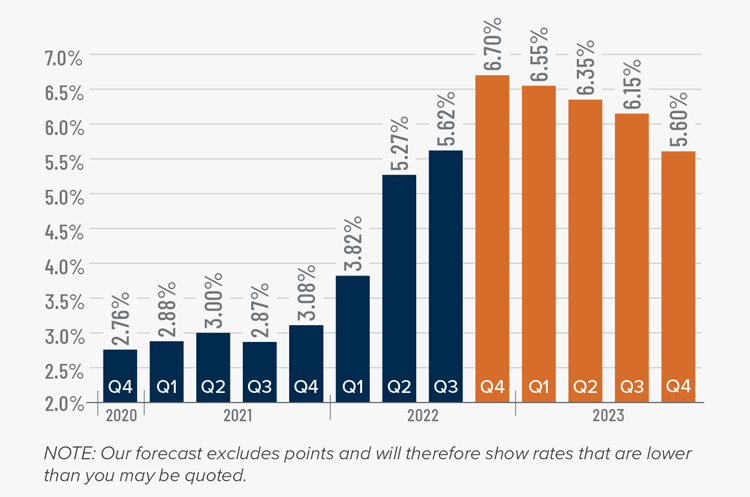
Eastern Washington Days on Market
❱ The average time it took to sell a home in Eastern Washington in the third quarter of 2022 was 24 days, which is 9 more days than during the same period a year ago.
❱ Compared to the second quarter of this year, average days on market rose in every county. The regional average rose by 6 days to 24.
❱ All counties saw the average number of days it took for a house to sell rise compared to the third quarter of 2021.
❱ Longer market time can be attributed to more inventory combined with higher financing costs, which have led some buyers to wait for mortgage rates to stabilize and/or for prices to drop further.
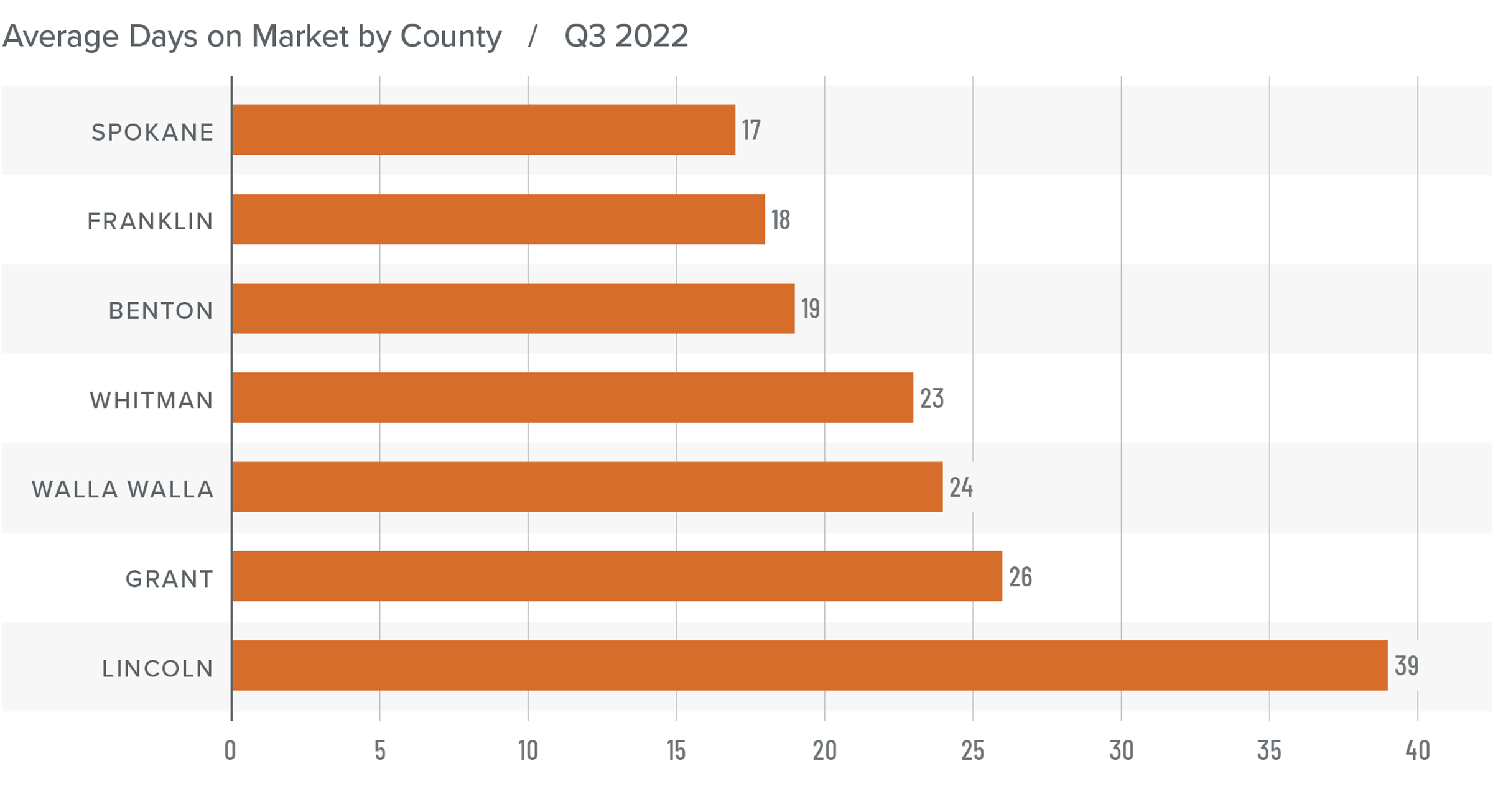
Conclusions
This speedometer reflects the state of the region’s real estate market using housing inventory, price gains, home sales, interest rates, and larger economic factors.
Regionally speaking, the job market continues to expand, which should be a benefit for the housing market. However, with mortgage rates rising more than 2.7% from a year ago, many buyers are now being priced out of the market. The third quarter was an inflection point in which higher financing costs are now acting as a significant headwind. I anticipate that the market will struggle until rates stabilize. Even then, affordability will remain a factor. Ultimately, prices are expected to pull back to account for higher mortgage rates, but I don’t believe there will be any systemic price correction. Rather it will be a reversion that will allow the market to move to a more sustainable pace of price growth.

As such, I have decided to move the needle more in favor of home buyers as the region heads toward a more balanced market—one we have not seen in quite some time.
About Matthew Gardner

As Chief Economist for Windermere Real Estate, Matthew Gardner is responsible for analyzing and interpreting economic data and its impact on the real estate market on both a local and national level. Matthew has over 30 years of professional experience both in the U.S. and U.K.
In addition to his day-to-day responsibilities, Matthew sits on the Washington State Governors Council of Economic Advisors; chairs the Board of Trustees at the Washington Center for Real Estate Research at the University of Washington; and is an Advisory Board Member at the Runstad Center for Real Estate Studies at the University of Washington where he also lectures in real estate economics.
 Facebook
Facebook
 X
X
 Pinterest
Pinterest
 Copy Link
Copy Link



